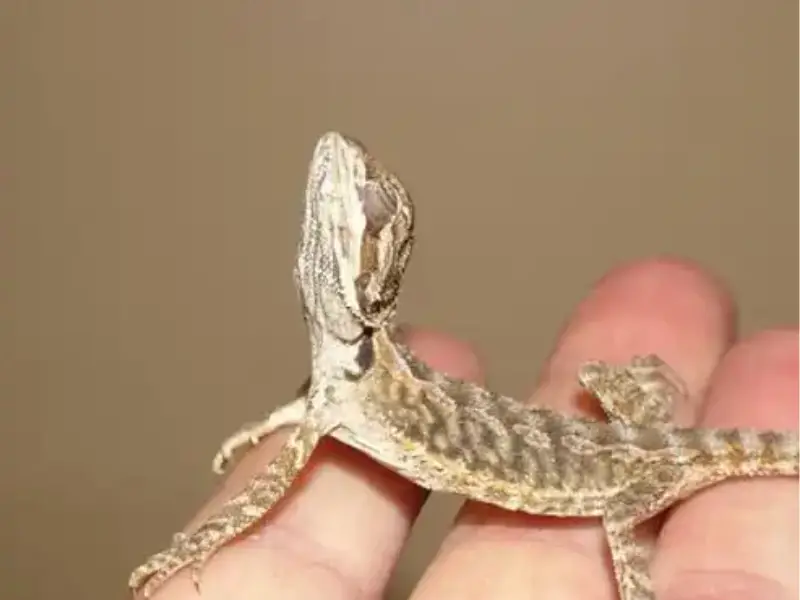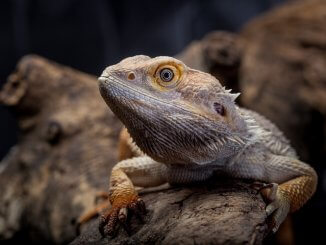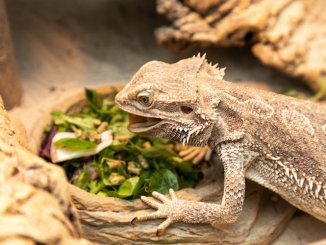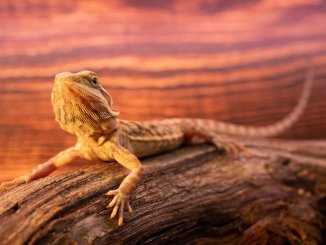Adenovirus in bearded dragons, also known as atadenovirus, wasting disease, or stargazing, is a common, highly contagious disease.
If your bearded dragon refuses to eat, loses weight, or sits in an unusual position with an arched back, it may have adenovirus.
This life-threatening infection requires immediate attention.
Use our helpful guide to recognize adenovirus in bearded dragons, learn how to treat its life-changing symptoms, and prevent it from infecting your other dragons.
What Is Adenovirus?

Adenovirus (ADV) is a common viral infection affecting bearded dragons.
This microscopic virus belongs to the viral family, Adenoviridae. There are several ADV viruses.
Typically, each adenovirus infects only one reptile species.
The adenovirus is a serious virus that causes inflammation of the host’s digestive system, affecting the liver, kidneys, gastroenteritis, stomatitis, and sometimes nervous tissue.
In severe cases, the adenovirus infects nervous tissue. This infection causes difficulty in walking or controlling limbs.
The virus causes your bearded dragon to look upward, almost as if it’s stargazing.
This behavior is why people often call adenovirus the “stargazing illness.”
Neurological damage can also cause bearded dragons to experience seizures.
The adenovirus also suppresses the bearded dragon’s immune system.
Because of this, bearded dragons can’t fight off infections.
So, some bearded dragons may have problems recovering from other common ailments, like kidney or liver diseases, and recurring illnesses or issues with parasites.
Adenovirus can cause infected dragons to die suddenly.
How Does Adenovirus Spread?
The adenovirus is highly contagious.
Most bearded dragons can become infected with the virus when they’re exposed to someone that’s recently handled an infected bearded dragon.
They can also get infected if they share a cage with an infected bearded dragon, are exposed to the feces of an infected dragon, or eat leftover food from an ADV-positive dragon.
Some bearded dragons hatch infected with ADV, while other hatchlings can catch it from their mother.
Once the adenovirus infects a bearded dragon, it carries the virus for the rest of its life.
Not all bearded dragons are affected by the virus. Some may appear perfectly healthy with absolutely no symptoms.
These dragons are known as asymptomatic carriers.
They can quickly become a problem for other bearded dragons in your collection since they may spread the adenovirus to the other dragons.
Since ADV is so contagious, it’s best to immediately isolate positive carriers.
Many asymptomatic bearded dragons can live long, happy lives, with only occasional flare-ups.
A crucial aspect of preventing the spread of adenovirus among bearded dragons is being able to recognize when a dragon has contracted the virus.
Adenovirus Symptoms
ADV can cause a wide variety of symptoms in captive bearded dragons.
The most common symptoms of adenovirus in bearded dragons are the following:
- Low appetite: Your bearded dragon will struggle or refuse to eat.
- Slow growth rate: Young bearded dragons will grow slower than their healthy counterparts.
- No weight gain: ADV can prevent your bearded dragon from gaining weight. The virus allows intestinal parasites, like coccidia, to thrive in the host dragon.
- Sudden weight loss: An ADV-positive dragon may suddenly lose weight. They may lose this weight because of a loss of appetite or intestinal parasites thriving in them.
- Constipation: Positive carriers may be constipated. However, not all ADV-positive dragons become constipated.
- Diarrhea: Your bearded dragon may experience severe diarrhea.
- Localized swelling: An ADV-positive dragon may develop unusually localized swelling all over its body.
- Weakness: Some bearded dragons become weak and unable to stand. This weakness may be due to a loss of appetite or the adenovirus affecting motor control.
- Erratic movement: In severe cases, your bearded dragon may start twitching, have seizures or display erratic movement. Some bearded dragons also assume the stargazing position. This position is a clear sign of ADV and rules out other common health issues, such as parasites or infections.
- Change in behavior: ADV-positive dragons often spend an unusual amount of time sleeping or hiding.
How To Identify If Your Bearded Dragon Has The Adenovirus
Unfortunately, people call adenovirus the ‘wasting’ or ‘stargazing’ disease for a good reason.
Typically, a young bearded dragon with adenovirus won’t survive past 3 months. It’ll struggle to grow, may be lethargic, lose weight, and won’t eat.
As a responsible collector or pet owner, you need to identify the symptoms of ADV quickly.
The faster you recognize an infected dragon, the quicker you can prevent this highly contagious virus from spreading to other dragons.
Every bearded dragon reacts differently to adenovirus though. So, your bearded dragon may display only some of the symptoms.
If it’s an asymptomatic carrier, it may not show any of the symptoms.
Since the symptoms vary from dragon to dragon, it makes identifying ADV tricky.
If you’re concerned that your bearded dragon may have adenovirus, it’s best to consult a registered veterinarian.
Most vets will perform a DNA probe test to determine whether your dragon has ADV.
Vets call this DNA test a PCR (Polymerase Chain Reaction) test. This non-invasive test only requires a swab of your dragon’s cloaca or feces to determine its ADV status.
Generally, young or old dragons are more at risk of contracting adenovirus.
Both young and old dragons have weaker immune systems, making them susceptible to more infections and health issues.
Young animals with ADV fail to thrive and experience higher death rates than adult bearded dragons.
Even should young dragons survive a flare-up of symptoms, they may be unhealthy for the rest of their lives.
If this is the case, you may have to provide it with special care for as long as it lives.
How To Treat Adenovirus In Bearded Dragons
There is no cure for adenovirus. The only reliable way to treat a dragon with ADV is to alleviate the symptoms.
There are several things you should do to help your bearded dragon survive ADV.
Even after surviving the initial infection, flare-ups of symptoms may occur from time to time throughout its life.
It would be best if you treated the symptoms as soon as they appear to ensure that your dragon enjoys a long, happy life.
Antibiotics
Most vets will prescribe a general antibiotic. This antibiotic won’t eliminate the adenovirus but will combat other infections that may hamper its recovery.
Remember, the adenovirus compromises the host’s immune system.
This compromised immune system makes them more vulnerable to other infections and parasites.
Antibiotics are vital to boost your bearded dragon’s compromised immune system.
Quarantine
You should immediately quarantine your ADV-positive bearded dragon.
The quarantine will lower the risk of the adenovirus spreading to other dragons.
You’ll also find it’s easier to look after a single dragon in quarantine.
Heat And Lighting
You should continue to provide your bearded dragon with the appropriate heat and UVB lighting.
Your goal should be to maintain optimal living conditions so your bearded dragon can quickly recover.
Optimal living conditions in a clean habitat will also prevent other infections and parasites from hampering your dragon’s recovery.
Feeding
If your ADV-positive dragon struggles to eat, you may have to revert to syringe feeding. Be careful not to overfeed your dragon. Often, a single-feeding session is best.
Throw any leftover food away. Never give this leftover food to your other healthy dragons.
The food most likely contains the adenovirus, and you don’t want to infect your other dragons.
Hydration
If your bearded dragon is dehydrated, give it a warm water soak. Ensure fresh and clean water is available to the dragon throughout the day.
Regularly throw out the water and replace it with fresh, clean water.
The adenovirus can contaminate water. Should your dragon get in contact with this contaminated water, it can get reinfected, or its condition can worsen.
Breeding
Even after your ADV-positive dragon recovers from its symptoms, you must never breed it.
ADV is a life-long infection and the virus can quickly spread from the mother to the hatchlings.
Quality Of Life
Finally, you must consider your bearded dragon’s quality of life. You must assess it regularly.
When you find that the quality of life has worsened to such a degree, euthanasia or palliative care may be better options.
Some bearded dragons with ADV live long, happy lives and may never even suffer symptoms.
Adenovirus isn’t always a death sentence. However, it can weaken others so severely that they require special, lifelong care.
For best results, owners should treat each case of ADV separately, on an animal-to-animal basis.
How To Prevent The Spread Of Adenovirus In Bearded Dragons
Since adenovirus is highly contagious, collectors and pet owners must try their best to prevent the spread of ADV in bearded dragons.
Only through prevention can we eliminate adenovirus in bearded dragons for good.
Luckily, there are several excellent ways to prevent this life-altering infection from affecting your dragons.
Determine The Cause Of Death
If you have several bearded dragons sharing habitat and one dies, it’s best to let a registered vet perform an autopsy.
This necropsy helps establish the cause of death.
If it died from ADV, you must test all your other animals.
Identify the positive carriers and quarantine them as soon as possible.
This prevents the adenovirus from spreading through your healthy dragons.
Opt For Individual Enclosures
Vets often recommend that owners keep bearded dragons in individual habitats.
When your bearded dragons are separated, it’s easier to contain the adenovirus and prevent healthy dragons from contracting it.
While it’s not always possible to store your dragons in separate enclosures, there are steps you can take when housing several in one habitat.
For instance, test all your dragons for ADV before you place them together in an enclosure.
Ensure Personal Hygiene
Your hygiene is just as vital as your dragon’s hygiene.
Owners should always thoroughly wash their hands before and after handling each bearded dragon in their collection.
Even if you only have one infected bearded dragon, always wash your hands after handling them or cleaning their enclosure.
Regularly Clean Equipment
It’s essential to clean surfaces and equipment daily.
Bearded dragons can contract ADV when they get in contact with infected surfaces, tools, or equipment.
If you have an ADV-positive bearded dragon, never share its equipment, like feeding tongs or water bowls, with your healthy animals.
Don’t Reuse Food
Never share uneaten food with your healthy dragons.
For example, if you move an uneaten cricket from an ADV-positive dragon’s cage to the feeder colony, the cricket may infect the other crickets.
In turn, those crickets will infect your healthy dragons. This same rule applies to bedding and greenery, such as salads.
ADV is highly-contagious so if you have an ADV-positive bearded dragon, you must not cross-contaminate their food with your healthy dragon’s food.
Give Separate Baths
If you bathe your bearded dragons, it’s always best to wash them separately. After every bath, throw out the water and rinse the bowl with a lizard-friendly disinfectant.
Dragons can get infected from contaminated water and surfaces, and you want to prevent this.
Disinfect Often
When cleaning the dragon’s habitat, use a lizard-friendly disinfectant spray. If you don’t have any, mix some water with a few drops of mild vinegar.
When you regularly disinfect the enclosures, you reduce the risk of ADV or any associated infections from spreading or worsening.
Create Optimal Living Conditions
Above all, ensure that your bearded dragon’s habitat has optimal living conditions.
Owners should regularly clean the habitats, including any decorations and water bowls. You must also provide perfect lighting, heating, and humidity.
Don’t overfeed your dragons. Check for parasites or other health issues regularly.
Optimal living conditions will strengthen your bearded dragons’ immune systems, making them more resilient to infections like ADV or parasites.
Key Takeaways
Adenovirus in bearded dragons is devastating. However, it may not always be a death sentence.
When owners take the appropriate measures to treat and prevent ADV, their dragons can live long, happy lives.
Owners should always keep an eye on their animals. Please take steps to determine what’s happening as soon as their behavior changes.
Remember, prevention is always better. So, make the following part of your daily routine:
- Get to know your bearded dragons: Each dragon has a different personality. When you know your dragons well, you can quickly spot any changes in behavior. Health issues, such as ADV, can cause changes in a bearded dragon’s behavior.
- Regularly wash everything: Clean equipment, feeding tongs, and habitats as often as possible. Try to prevent cross-contamination and ensure optimal, clean living conditions.
- Quarantine new dragons: When adding a new dragon to your collection, it’s best to quarantine it first. Let a registered vet perform a PCR test to determine your dragon’s ADV status. Only after it tested negative for adenovirus may you place it with your other, healthy animals.
- Educate yourself: Bearded dragons are fascinating animals. Educate yourself on them as much as possible. With more experience and knowledge, you can ensure your dragons are happy and healthy. You’ll also be more capable of spotting health issues and alleviating them as soon as they develop.
- Buy older dragons: To lower the risk of buying a bearded dragon with ADV, you should try and get a dragon at least 3 – 6 months old instead. Most hatchlings with ADV die before they reach the age of 3 months. If the dragon is older than 3 months, chances are good it’s strong enough to survive an ADV infection. Even then, insist on testing the dragon for adenovirus.
Whether you have one or several bearded dragons, ADV is a common risk. As a responsible collector or pet owner, you can prevent it and ensure your dragons live long, happy lives.
Adenovirus In Bearded Dragons: Frequently Asked Questions
Is Adenovirus Contagious To Humans?
The kind of adenovirus your bearded dragon can contract isn’t transmissible to humans.
You may handle your ADV-positive dragon without fear of becoming infected. However, always wash your hands and equipment to ensure you don’t spread the adenovirus to other healthy dragons.
How Do I ITreat Adenovirus In Bearded Dragons?
There’s no cure for adenovirus in bearded dragons. You can only treat or alleviate the symptoms of adenovirus.
Some steps you can take include antibiotics, ensuring optimal living conditions, and regularly cleaning the habitat.
Despite no cure for ADV, many bearded dragons live long, healthy lives, even with ADV.
How Common Is Adenovirus In Bearded Dragons?
Adenovirus is, unfortunately, very common in bearded dragons. They may get infected by their mothers, other bearded dragons, or by sharing a habitat, food, and water.
ADV occurs in captive and wild bearded dragons.
How Contagious Is Adenovirus In Bearded Dragons?
Adenovirus in bearded dragons is highly contagious. It would be best to immediately quarantine ADV-positive dragons and never breed them.
Avoid using the same tools and equipment between positive and negative animals. If you don’t, you risk infecting your other dragons.
For How Long Is Adenovirus In Bearded Dragons Contagious?
ADV-positive bearded dragons are contagious for the remainder of their lives. Owners should prevent interaction between contagious and healthy dragons as soon as possible.
Adenovirus never goes away, and your ADV-positive dragon must live its life out in quarantine.




